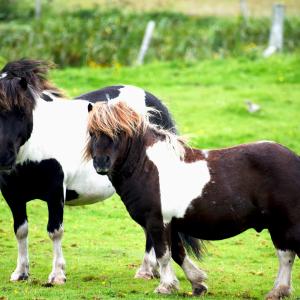
By Vet Freya Wood

Our aim is always to be proactive in all aspects of the healthcare of our equine friends, to catch problems early and act to resolve them before they progress. Dentistry is no exception.
Dental pain is not insignificant, and anyone who has had a problem with a tooth can attest to that - it is the same in our equine patients!
A horse is a prey species and their behaviours reflect this. They do not want to give away signs of pain that would have indicated to a predator that they were the weakest member of their herd.
A horse showing signs of dental discomfort, be that quidding (dropping balls of partially chewed forage) or poor ridden behaviours, often has significant dental problems. Many horses with significant dental problems will show little to no obvious signs of pain. Our horses are designed to be eating for around 16 hours a day, so they need to be able to do this comfortably.
Sadly, a number of groups of equines tend to be forgotten when it comes to routine healthcare and dentistry is no different. These groups are often the ones that actually need the most attention!
Older equines - this group from late teens onwards are undergoing much change in their dentition and require regular dental examinations, usually every 6 months at a minimum. A very common dental disease in older horses is formation of diastema or diastemata which is an extremely painful condition. Food packs in abnormal spaces due to the narrowing of the teeth as they grow through, leading to disease of the gums. Irrespective of the secondary problems this can cause, a horse with diastema is in a significant amount of pain and catching and beginning to manage these diastema early is very important. The older horse is also going to start to lose the strength of the attachment of the tooth in the socket leading it to become mobile. Chewing on a loose tooth is incredibly uncomfortable, so identifying and removing these teeth enables these horses to eat comfortably. EOTRH is another painful condition in the older horse that requires treatment.
Broodmares - the dental care of the broodmare is often forgotten, particularly those that are bred from reasonably regularly. We want to avoid stress in the pregnant mare, often a reason given not to get their teeth done, however dental pain is stressful for her too! Ideally as part of the preparation to be put in foal these mares should have a thorough dental examination and any issues addressed. If the mare requires dental treatment during the pregnancy often it is better to address it sooner rather than later. We must remember that this mare is growing a foal, needs to produce good quality colostrum and is also going to be feeding the foal once it is born therefore must be in the best shape to do so.
Donkeys, Shetlands and miniature breeds - these tend to have smaller, narrower mouths and the problems that come with them. As they are often not ridden or in little ridden work and are generally stoic, problems can go undetected and by the time they are checked issues can be hugely challenging to resolve.
It is important that the person caring for your equine’s teeth is a suitably trained and qualified vet or equine dental technician. Lists of qualified equine dental technicians can be found on the BAEDT website and through WWAED. It is important to remember that a number of procedures, classed as category 3, including almost all extractions, can legally only be performed by a veterinary surgeon.